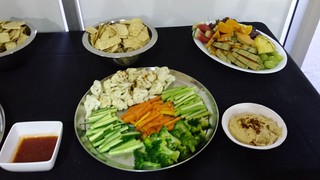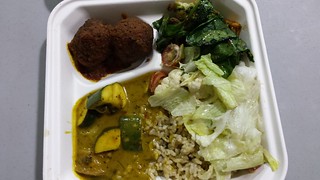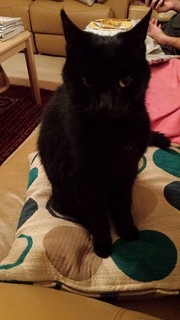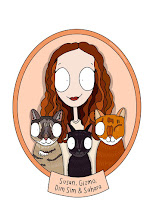The first talk, 'the duty to bear witness', was given by Anita Krajnc of Toronto Pig Save (given via Skype). Anita gave a brief history of 'bearing witness' through social justice leaders and literature, then an update on Toronto Pig Save and her impending court case.
Morning tea was a selection of fruit, and hummus with veggies. I was very pleased that they had slightly steamed the broccoli and cauliflower (I find they hurt my stomach if I eat them raw unless they are very finely shaved or chopped).

I then went to a talk by Kelly Levenda of VeganGMO about 'how biotechnology can help humans, non-human animals, and the environment' (also via Skype). This talk was fascinating, and discussed a lot of the ways that biotech can help reduce or remove animal use in food, medicine and other aspects of life, as well as how it can provide greater food security and environmental benefits. I know GMOs can be a contentious issue in the world, and in the vegan world as well, but I am all for responsible science helping to make things better.
The next talk was 'understanding and using values in creating change for animals' by Marianne Macdonald. This was an interactive presentation, with lots of discussion! The basis was about using values as a method of motivating change, and used a chart with 58 core values (grouped into categories) to discuss what we should be aiming for. The interesting part came in that different people had different interpretations of the different values, so there was lots of great points raised.
Then it was lunch time! Again provided by the Cardamom Pod. Because both Elizabeth and I found it a bit spicy the day before, they put together a milder option for us, with a higher rice to curry ratio and some cooling salad.

After lunch I went to a talk about 'animals used in science', given by Alexandra Sedgwick of Cruelty Free Labs Australia. The talk ended up mostly being about how she started and ran her campaign, I had was hoping for a bit more information about the organisation itself and humane education.
I had to take a break and sit out for a bit after this. I was feeling pretty terrible about my time in vet school, where there were a lot of animals used in classes. I was a new vegan, very isolated, very timid. I did decline to take part in several classes (especially in later years when I was a bit more confident), but I still feel pretty crappy that I didn't speak up more during my time in vet school. (Interestingly, the new Uni of Melbourne post-grad vet degree has a stipulation that you must consent to animal use in class, or you cannot take part in the degree... they know the tides are turning). Anyway, basically I had to go and have a cry and a breather.
Then afternoon tea! Even though I wasn't feeling terribly hungry, I still managed to find room for a beautiful aquafaba meringue (I chose pink), and also a few slices of fruit.

The final talk I went to was called 'Vivisection: The evidence is all on our side' by Douglas Leith. He quoted a lot of articles and examples that really show that animal testing is a costly and inhumane practice, given that humans are not monkeys, rats, mice, etc. This tied in a little with the biotech talk from earlier, where they offered some cool alternatives to animal testing. I have heard several interviews on this topic, and a lot of researches do seem to want to move away from animal testing, but there is so much bureaucracy that makes it hard to do so.
The conference ended with a wrap-up meeting, where it was announced that next year's Forum will be held in Melbourne. I am hoping it works with my roster so that I can go! It was a pretty intense weekend, and very emotional at times. But it is important to remember why we do the things we do, and how we can do them better. The animals are counting on us.
Cute Kitty Photo of the Post

Let's lighten the mood a little with a photo of Dim Sim being super cute!





That's nice that they steamed the broccoli and cauliflower; I can't eat them raw either, so I always have to skip over them in veggie plates!
ReplyDeleteGood for you for taking a break from the forum when you needed to! The only time I had to do anything with an animal in class was in high school biology -- the frog dissection -- and I'm pretty sure the teacher purposely "surprised" us with the lesson that day so that no one had time to prepare to stand up against it. I wasn't even vegan at the time but it upset me so much that I "zoned out" and went really numb during it, looking back I realize that was me dissociating. :(
But yay for lightening the mood with Dim Sim; she looks like a little owl hehe! :D
I think a lot of vet school was an exercise in dissociation. :/
DeleteDim Sim does look like a cute little owl. Her ears aren't really that long, but the camera made them look like that.
I thought I was the only one who preferred cooked broccoli & cauliflower. I love that they steamed it for everyone.
ReplyDelete"Anyway, basically I had to go and have a cry and a breather." That must have been hard for you. I don't think you should feel too badly though - we are all trying to make as much of a difference as we can, even though we can't always put into action what we feel is right or not do something we feel is wrong. *hugs*
I think I've said this before, but I really do admire you for going to these talks. I find it too difficult myself. Some of them do sound very interesting though.
It is a good forum, though challenging at times. I feel better now that I got all that out of my system. Still sad that it happened, but not so consumed by it.
Delete"how biotechnology can help humans, non-human animals, and the environment"
ReplyDeleteThat's exciting! I am not what you would say pro-GMO, it is just straight up more complicated than that, but the more I educate myself about the science involved with it, there are lots of ways it can help. A lot of the problems with GMOs I think stem from big corporations. But yeast GMOs are the reason why vegan food tastes so good anymore! All those yummy flavorings are now becoming more and more from GMO yeasts.
I am pro-responsible science, but you also need to take a look at who is behind it and what they are doing. One of the nice thing she talked about was some of the royalty-free strains of crops that have been produced to help provide food security to developing nations.
Delete